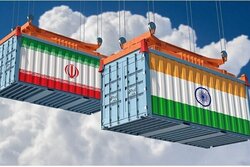
Non-oil goods worth $624m exported from Iran to India in 4 months

As reported, India was the fifth top export destination of Iranian non-oil goods in the mentioned four-month period.
Based on the data previously released by the Indian Ministry of Commerce and Industry, the value of Iran’s export to India increased by six percent during the first four months of 2023, as compared to the same period of time in 2022.
Iran’s export to India stood at $257 million in January-April 2023, while the figure was $242 million in January-April 2022.
India’s export to Iran fell 29 percent from $631 million in the first four months of 2022 to $445 million in the first four months of this year.
Based on the data previously released by the Indian Ministry of Commerce and Industry, the value of Iran’s export to India increased by 60 percent in 2022 as compared to the preceding year.
The Indian ministry put the worth of Iran’s exports to India at $653 million in 2022, while the figure was $409 million in 2021.
As reported, petroleum products have been the major goods imported by India from Iran in the said months.
According to the mentioned data, the value of trade between Iran and India reached $2.5 billion in 2022, rising 48 percent from $1.693 billion in 2021.
During January-December 2022, India’s export to Iran also increased by 44 percent to stand at $1.847 billion, while the figure was $1.284 billion in 2021.
Rice was India’s major product exported to Iran in the said period during which the country shipped $1.098 billion worth of rice to the Islamic Republic.
On June 10, the agricultural officials of Iran and India agreed to form a joint committee for agricultural cooperation between the two countries within the next three months.
As reported, the agreement was reached in a meeting between Iran's Deputy Agriculture Minister Mohammad-Mehdi Borumandi and Secretary of India's Agriculture and Farmers Welfare Ministry Manoj Ahuja in New Delhi.
Borumandi, who traveled to New Delhi to hold talks on the agricultural cooperation between Iran and India, met with his Indian counterpart to review the latest status of bilateral cooperation in the field of agriculture.
The officials also agreed to hold the first joint working group on agricultural cooperation between the two countries in the near future.
In the meeting, Borumandi stressed Iran's readiness for cooperation in various fields including horticultural products, medicinal plants, combating plant pests, agricultural technologies, exchange of professors and experts, and cooperation between research institutions of the two countries.
He considered the removal of tariff barriers on agricultural trade as a necessity for the future expansion of relations.
Manoj Ahuja, for his part, highlighted the cultural and geographical affinities between the two nations and expressed his country's readiness to develop agricultural relations with Iran.
Welcoming the fields proposed by the Iranian side for cooperation, the Indian official announced that the ban on the exports of kiwi to India, which had been temporarily prohibited since last year due to quarantine considerations, has been lifted.
On June 20, Iran’s Trade Promotion Organization (TPO) hosted a conference on introducing the opportunities and capacities of presence in the Indian market.
The conference was attended by officials from the two sides including the ambassadors of the two countries, board members of the chambers of commerce of Iran and India, and more than 300 businessmen from both sides, the TPO portal reported.
The TPO Acting Head Mehdi Zeyghami, Iranian Ambassador to India Iraj Elahi, and India’s Ambassador to Tehran Rudra Gaurav Shresth were among the speakers at the conference.
Speaking at the opening ceremony of the event, Zeyghami pointed out that India is one of the main trade priorities for Iran, saying: “Considering the huge volume of India's trade with the world, Iran has a small share, which should be increased.”
“Holding such conferences and workshops along with exchanging trade delegations can lead to the strengthening of business relations between the two countries and ultimately lead to the prosperity of trade,” he added.
Referring to the existing obstacles in the way of trade development with India, Zeyghami said: “Strict standards and high tariffs for Iranian agricultural products have caused these products to be smuggled to neighboring countries that have zero tariffs with India and then exported to India, which has caused damage to Iranian businessmen.”
Referring to TPO’s plan to revive idle trade agreements with other countries, the official said: “Free trade with Eurasia and preferential trade agreement with Indonesia have been concluded, and preferential trade agreements with other countries are being pursued, and we have the same seriousness regarding our preferential trade agreement with India.”
Further in the conference, Shresth referred to the history of cultural, political, and commercial relations between Iran and India and said: “We hope that holding such programs will lead to the development of commercial relations between the two countries.”
Pointing to the existing obstacles in the way of the expansion of trade relations between India and Iran, he said: “Solutions have been found to overcome the obstacles, especially in financial and banking issues.”
Source: Tehran Times


Newmont nets $100M payment related Akyem mine sale

First Quantum scores $1B streaming deal with Royal Gold

Caterpillar sees US tariff hit of up to $1.5 billion this year

Gold price rebounds nearly 2% on US payrolls data

Copper price collapses by 20% as US excludes refined metal from tariffs

St Augustine PFS confirms ‘world-class’ potential of Kingking project with $4.2B value

Goldman told clients to go long copper a day before price plunge

B2Gold gets Mali nod to start underground mining at Fekola

Copper price posts second weekly drop after Trump’s tariff surprise

Codelco seeks restart at Chilean copper mine after collapse

US slaps tariffs on 1-kg, 100-oz gold bars: Financial Times

BHP, Vale offer $1.4 billion settlement in UK lawsuit over Brazil dam disaster, FT reports

NextSource soars on Mitsubishi Chemical offtake deal

Copper price slips as unwinding of tariff trade boosts LME stockpiles

SAIL Bhilai Steel relies on Danieli proprietary technology to expand plate mill portfolio to higher steel grades

Alba Discloses its Financial Results for the Second Quarter and H1 of 2025

Australia weighs price floor for critical minerals, boosting rare earth miners

Australia pledges $87M to rescue Trafigura’s Nyrstar smelters in critical minerals push

Fresnillo lifts gold forecast on strong first-half surge

US slaps tariffs on 1-kg, 100-oz gold bars: Financial Times

BHP, Vale offer $1.4 billion settlement in UK lawsuit over Brazil dam disaster, FT reports

NextSource soars on Mitsubishi Chemical offtake deal

Copper price slips as unwinding of tariff trade boosts LME stockpiles

SAIL Bhilai Steel relies on Danieli proprietary technology to expand plate mill portfolio to higher steel grades

Alba Discloses its Financial Results for the Second Quarter and H1 of 2025

Australia weighs price floor for critical minerals, boosting rare earth miners

Australia pledges $87M to rescue Trafigura’s Nyrstar smelters in critical minerals push

Fresnillo lifts gold forecast on strong first-half surge















